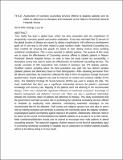Assessment of nutrition counseling services offered to diabetic patients and its effect on adherence to therapies and treatment at the Nakuru Provincial General Hospital, Kenya

View/
Date
2012-06Author
Karanja, Lucy W
Type
ThesisLanguage
enMetadata
Show full item recordAbstract
Poor health has been a global issue which has been associated with the impediment of productivity, economic growth and poverty eradication. It has been estimated that 32 percent of the global burdens of disease are caused by dietary complications. All millennium development goals are in one way or the other related to good nutrition intake. Nutritional Counseling has been credited for ensuring that people are aware of their dietary choices hence avoiding nutritional complications. This is more essential to diabetic patients. The purpose of this study was to assess the effectiveness of Counseling services offered to diabetic patients in Nakuru Provincial General Hospital, Kenya. In order to have the study carried out successfully, a descriptive survey was used to assess the effectiveness of nutritional Counseling services. The sample consisted of 283 respondents that included 8 dieticians and 275 diabetic patients. Stratified random sampling where the total population was split into two distinct samples (diabetic patients and dieticians) based on their demographics. After obtaining permission from all relevant authorities, the researcher collected the data in form of responses through structured questionnaires. Expert judgment was used to improve on content and construct validity of the items. The Statistical Package for Social Sciences (SPSS) was used to analyze the data. The study established that there was a significant relationship between the patient’s nutritional knowledge and recovery rate. Majority of the patients were not adhering to the recommended therapy. There was a statistically significant influence of nutritional counselors’ knowledge of diabetic management and diabetics’ recovery rate. There was also a significant relationship between the economic status of patients and adherence to therapy. This study recommends that the government must take an active role in promoting the nutritional counseling services offered in hospitals by employing more dieticians, intensifying awareness campaigns on the recommended diet for the diabetics. Civil society and religious groups must also take an active role by holding workshop and seminars to sensitize the community about the diabetic condition, psychological support and fighting against stigma to the patients. Additionally, dieticians need to be aware of the current recommendations for diabetic patients so as to pass it on to their clients. Male nutritionists/dieticians should also be trained to encourage more male patients to attend counseling sessions. The researcher suggests a further research on the level of stakeholders input in promoting nutritional counseling in hospitals and an assessment on whether patients actually adhere to the diet by doing a 24 hour recall.
Publisher
KeMU
Description
RC 628 .K3 2014
Collections
- Master of Arts in Counseling [46]
- Thesis [44]
